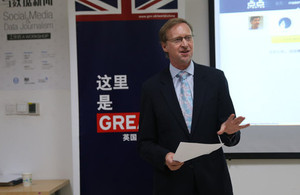CG Brian Davidson delivers speech on UK-China media exchange
Consul General Brian Davidson delivers speech on UK-China media exchange at Social Media and Data Journalism workshop at SISU.

Consul General Brian Davidson delivers speech on UK-China media exchange
It is pleasure to join you at the end of this first day – it is great to see this media exchange between Shanghai International Studies University, Thomson Foundation and the British Consulate General in Shanghai. Welcome to the course.
I started my diplomatic career in China 25 years ago in the Embassy in Beijing where one of my roles was as press officer. In those days exchanges with the media tended to be sharing information with – and fending off difficult questions from – the international media resident in China. Trying to place articles about the UK in Chinese publications and market UK promotional material to Chinese radio and TV stations across the country. More propaganda than partnership if we are being honest.
So much has changed in those 25 years – not least in the mass media environment, with the development of ‘new media’, of social media – and the way citizens and governments are accessing those opportunities to communicate and influence. And in the sort of journalistic partnerships developing between our countries – exemplified by the seminars over the next few days.
You will know better than I the challenges facing traditional media (newspapers, TV channels etc) the world over. New media, although no longer very ‘new’ per se has proved to be a formidable force. You know more about this than I do. Everyone, everywhere at almost every level it seems is – and indeed if you want to get your message out – has to be part of this new development. Most of my access to news, information, editorial comment and analysis is now through online sources – directly from news providers or indirectly from re-tweeted articles on my professional and social networks.
As a Consulate we too have needed to focus more of our communication efforts into online platforms and more visually and sensory stimulating platforms.
Mass communication remains a powerful force for good and a fundamental agent of social, political and economic change, for nations and citizens alike. The UK has a strong tradition of robust investigative journalism, of challenging inequity, of exposing malpractice and of defending the rights of minorities to have their views heard. I think the same core values can be seen in much of the media here – particularly in the digital sphere.
So just like we need to cooperate and learn from each other in terms of our economic partnerships and in science and innovation, so too we can learn more from each other (as well as about each other) through media working practice exchanges.
Britain is one of the leading countries in pushing forward online reporting and a considerable number of British government officials - including the Prime Minister - are increasingly active on social media. It is both a challenge and an opportunity. But more importantly it is now an essential part of the dialogue between government and its citizens – between our leaders and their constituents (and opponents). And I would say that – unlike 25 years ago when I first engaged with media in China - the challenges and opportunities now facing journalists and editors in this country feel very similar to those in my own country.
So it is a good time to share and learn from each other. And I hope this course will help us build a better understanding of each other – will help you see how to develop additional innovative content when conducting online reporting - and support you in the transformation of your own organisations.
In that respect we are very fortunate to have Daniel Mason from Thomson Foundation here to share his experiences. Dan is an award-winning editor-in-chief and senior executive who has served leading daily newspapers, magazines and online operations in the UK for over 25 years. The Thomson Foundation, the world’s longest established international media development organisation, has played a vital part in raising journalistic standards around the world in the past 50 years.
Finally, I would like to thank the School of International Journalism, Shanghai International Studies University for their support in facilitating this workshop. And thanks all of you for participating.